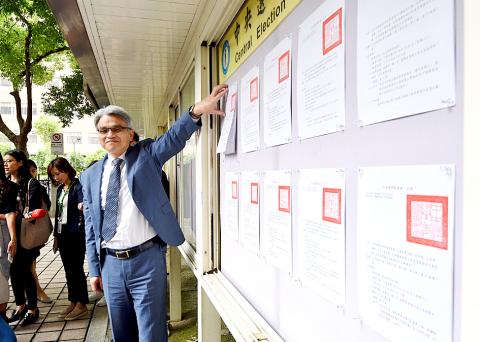The Executive Yuan has agreed to increase incentives to polling booth monitors and volunteers for the local elections on Nov. 24, the Central Election Commission (CEC) said yesterday.
The incentives — two compensatory days off instead of one and a higher pay — should facilitate the commission’s efforts to enlist volunteers, it said, amid rising concern that the commission and voting station staff would be overwhelmed by the increased workload with the addition of 10 referendum questions to the nine-in-one elections.
The commission is reaching out to universities to recruit students as volunteers, with CEC Chairman Chen In-chin (陳英鈐) encouraging students to participate in the civic process.

Photo: Peter Lo, Taipei Times
The only requirement to qualify as a volunteer is that they be a Republic of China citizen, Chen said.
Asked whether having student volunteers would lower student participation in the vote, Chen said volunteers have the option of voting at their registered residences or the voting station where they have been assigned.
The Legislative Yuan last year approved amendments to the Referendum Act (公民投票法) lowering the legal voting age for referendums to 18.
Recruitment results will be announced on a weekly basis, Chen said, adding that the commission’s target is to have civil servants and teachers make up half of the polling booth workers with the half being drawn from the general public.
There are to be four ballot boxes: for the nine-in-one election ballot; for referendum numbers 7 to 9; for referendum numbers 10 to 12; and for referendum numbers 13 to 16.
To date, the nation has held six referendums, the first and second held in conjunction with the 2004 presidential election, and the other four during the 2008 presidential election.
The commission said it hopes to conclude all ballot counting before midnight of voting day.
The commission also released a list of the 10 referendums that are to be included in this year’s vote: three by the Chinese Nationalist Party (KMT) — two on air pollution and one on banning food products from Fukushima Prefecture; three by the Happiness of the Next Generation Alliance against same-sex marriage and education; two by LGBT support groups on supporting same-sex marriage and education; one on having Taiwan participate in the 2020 Tokyo Summer Olympic Games under the name of Taiwan and not Chinese Taipei; and one on scrapping the “2025 nuclear-free homeland” target.

A preclearance service to facilitate entry for people traveling to select airports in Japan would be available from Thursday next week to Feb. 25 at Taiwan Taoyuan International Airport, Taoyuan International Airport Corp (TIAC) said on Tuesday. The service was first made available to Taiwanese travelers throughout the winter vacation of 2024 and during the Lunar New Year holiday. In addition to flights to the Japanese cities of Hakodate, Asahikawa, Akita, Sendai, Niigata, Okayama, Takamatsu, Kumamoto and Kagoshima, the service would be available to travelers to Kobe and Oita. The service can be accessed by passengers of 15 flight routes operated by

MORE FALL: An investigation into one of Xi’s key cronies, part of a broader ‘anti-corruption’ drive, indicates that he might have a deep distrust in the military, an expert said China’s latest military purge underscores systemic risks in its shift from collective leadership to sole rule under Chinese President Xi Jinping (習近平), and could disrupt its chain of command and military capabilities, a national security official said yesterday. If decisionmaking within the Chinese Communist Party has become “irrational” under one-man rule, the Taiwan Strait and the regional situation must be approached with extreme caution, given unforeseen risks, they added. The anonymous official made the remarks as China’s Central Military Commission Vice Chairman Zhang Youxia (張又俠) and Joint Staff Department Chief of Staff Liu Zhenli (劉振立) were reportedly being investigated for suspected “serious

ENHANCING EFFICIENCY: The apron can accommodate 16 airplanes overnight at Taoyuan airport while work on the third runway continues, the transport minister said A new temporary overnight parking apron at Taiwan Taoyuan International Airport is to start operating on Friday next week to boost operational efficiency while the third runway is being constructed, the Ministry of Transportation and Communications said yesterday. The apron — one of the crucial projects in the construction of the third runway — can accommodate 16 aircraft overnight at the nation’s largest international airport, Minister of Transportation and Communications Chen Shih-kai (陳世凱) told reporters while inspecting the new facility yesterday morning. Aside from providing the airport operator with greater flexibility in aircraft parking during the third runway construction,

Taiwanese and US defense groups are collaborating to introduce deployable, semi-autonomous manufacturing systems for drones and components in a boost to the nation’s supply chain resilience. Taiwan’s G-Tech Optroelectronics Corp subsidiary GTOC and the US’ Aerkomm Inc on Friday announced an agreement with fellow US-based Firestorm Lab to adopt the latter’s xCell, a technology featuring 3D printers fitted in 6.1m container units. The systems enable aerial platforms and parts to be produced in high volumes from dispersed nodes capable of rapid redeployment, to minimize the risk of enemy strikes and to meet field requirements, they said. Firestorm chief technology officer Ian Muceus said